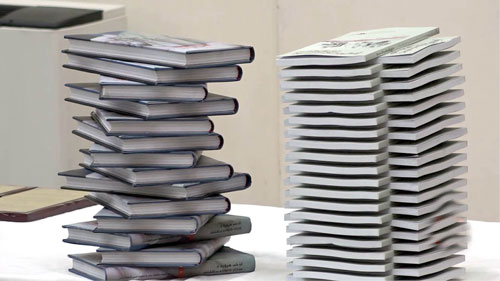A three-day exhibition of books and handicrafts has been held in Kabul where publishers and female entrepreneurs have displayed their products.
But publishers and women entrepreneurs said they need better opportunities for running their businesses. They asked the Islamic Emirate to allow women to work.
“We do not have a permanent market. Such markets should be considered for women entrepreneurs because there hasn’t been any place for us for years,” said Rahima Hajizada, a female entrepreneur.
“We need to conduct and improve our activities the same as we did under the previous government,” said Arezo, an entrepreneur.
The information and culture deputy minister, Zabihullah Mujahid, who attended the opening ceremony of the exhibition, said such events are essential for the country’s development.
“And this is an order and guidance for us, too, may Allah grant us success to follow the Quran until the day we die,” he said.
At the same event, members of the Afghan Publishers Union said there is a need for a department for them to be established in the Ministry of Information and Culture to protect the bookselling and publishing businesses.
“We play a key role in introducing books to society to help people gain knowledge,” said Sayed Ahmad Saeedi, head of the Afghan Publishers’ Union, referring to the role of their community in Afghan society.
The Ministry of Information and Culture officials vowed at the event to address the demands shared by female entrepreneurs and bookshops owners.
A poetry and literature festival titled “Wounds of War” was held in Kabul on Wednesday with the participation of some of Afghanistan’s prominent poets, writers and historians.
The festival was organized by the Afghanistan Human Rights and Democracy Organization.
Poets Ramin Mazhar, Hekmat Nazari and Jalal Nazari took first, second and third place, respectively, in the festival’s poetry category.
“I hope that these festivals are not held only for awards and prizes. We need storytellers, because we remained silent in a way over the past four decades,” said Humaira Qaderi, a writer.
Participants, which included poets, writers and historians, told their stories of war.
“Your pen is your weapon, you must defend all human values, it is not like the Taliban who sing the story of a massacre,” said Kawah Jibran, a poet and writer.
The famous works read in the festival included Dastan-e-Marg Khawstan from Omid Haqbin, Utaq-e-115 from Estamatullah Kohzad, Tu Chi Fekr Mekoni Reza from Masooma Amiri, Tairhay-e-Karachi Chartayrah from Noor Mohammad and Dunyay-e-Mordaha from Reza Akhaz.
200 poets, writers, storytellers, historians and other literary figures participated in the festival. Two books, named “Namekhawham O Khakestar Shawad” and “Mian-e-Do Enfejar,” were also introduced at the festival.










